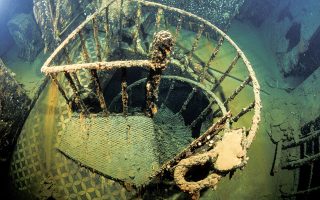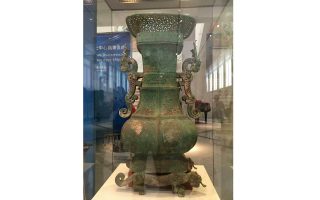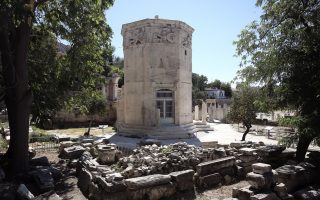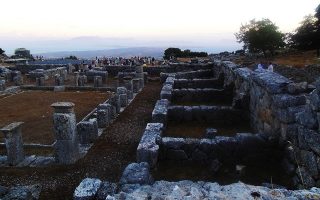Santorini hosts its first wine tourism conference
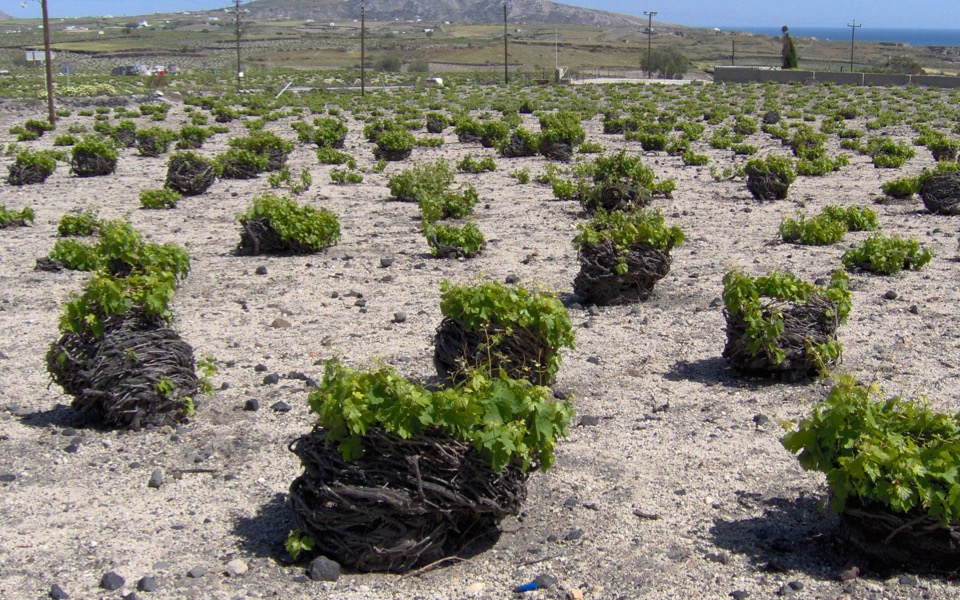
Agricultural Development Minister Vangelis Apostolou vowed improvements to Greek legislation protecting the ancient vineyards of Santorini, telling Kathimerini that efforts will also be made to designate this wine-producing island a “high-yield zone” to curb the expansion of construction.
Apostolou was responding to a demand expressed by Santorini Mayor Anastasios-Nikolaos Zorzos at the First International Wine Tourism Conference on the southern Aegean island earlier this month where all the delegates agreed that the first step to developing wine tourism in any part of the country is a strong institutional framework and cast-iron protection laws.
Santorini has 1,200 hectares of vineyards, the majority of which are planted with the famed Assyrtiko variety, which has seen a spike in demand in recent years that in 2016 pushed the price to 3 euros per kilo, compared with 1.80 euros or less for other well-known varieties elsewhere around the country. However, before the tourism boom started a few decades ago, Santorini had more than 2,700 hectares of vines.
“The Mediterranean’s oldest vineyard needs protection,” stressed Zorzos, calling for stricter zoning laws and an organized plan for all construction. “We have 62 vine varieties and the balance between tourism and cultivation should not be upset any further. After all, it is a known fact that excess always leads to poverty.”
Wine tourism could in fact generate significant benefits for the island, which could model the sector along similar lines to France’s Champagne region. Turnover in French champagne last year came to 5.8 billion euros, with 312 million bottles sold and 30,000 hectares dedicated to the production of the sparkling wine.
Interestingly, a study presented at the conference by Theodoros Georgopoulos, president of the Georges Chappaz Institute for the development of wine in Champagne, pointed to a paradox in the French wine region: While everyone knows what champagne is, just 50 percent of respondents in a survey held five years ago could point out the region on a map.
However, after UNESCO listed “Champagne Hillsides, Houses and Cellars” as a world heritage site in July 2015, local officials seized the opportunity to acquaint the world not just with the fine product, but also with the region and the producers. So, from around 500,000 visitors a year, most of whom were day-trippers, Champagne last year welcomed 1.2 million, 60 percent of whom were non-French and many of whom stayed for several days. From a wine-producing region, Champagne has evolved into an “experience holiday” destination, and today wine tourism has generated 14,600 additional jobs, on top of the 30,000 existing in the production of champagne.
Georgopoulos further explained how the people of Champagne took the initiative on an institutional level as well, setting their own protection rules in the absence of a preexisting framework. Every year, for example, experts draw up a new plan delineating any interventions in the area. Even the wineries are not allowed to expand without taking the area’s profile and aesthetic identity into account first.
As far as Santorini is concerned, “it has been estimated that last year’s revenues could be boosted by 30 percent with the promotion of wine,” according to Paris Tsartas, a professor of tourism development in the Business Management Department at the University of the Aegean.
His opinion was also backed by Apostolou, who likened the development of wine routes to the construction of new highways in terms of the prospects they bring.
Industry heavyweight
The Santorini conference was also attended by Yiannis Boutaris, a heavyweight in the Greek wine industry and also mayor of Thessaloniki, in whose honor a special event was held by the National Inter-professional Organization of Wine and Vine (EDOAO).
EDOAO president Yiannis Vogiatzis talked about Boutaris’s significant contribution to the development of Santorini’s wine industry and referred to the days when he started working at the Boutaris Winery fresh out of university in 1984.
“Yiannis Boutaris came to me and said: ‘How do you feel about going to Santorini? We could do something there.’ How was I to feel? There was no greater challenge, opportunity, for a young oenologist like me,” said Vogiatzis.
After numerous trials in the vineyard and the lab, Boutaris launched his first Santorini wine in 1987 and two years later opened a winery in the village of Megalochori that was the first on the island to introduce modern machinery and methods, and to open its doors to the public. The Boutaris Winery was instrumental in evolving Assyrtiko from a simple house wine into a global ambassador for Greek wines.
“Wine should become a part of everyone’s life, not just of vine growers and winemakers. Our job is not about taking each other’s piece, but making sure that the pie gets bigger so we can all eat better,” Boutaris told the First International Wine Tourism Conference organized by Heliotopos Conferences and sponsored by Kathimerini and Oinochoos magazine.
“Wine is part of the art de vivre,” he said. “People visiting the winery want to have a good time, listen to a story and live and experience – not just drink – good wine. Austria has managed to generate 5 million overnight stays in the Rhine Valley, for example.”
The businessman urged fellow winemakers on Santorini to reconsider the option of selling their land to hotel developers, a pressing issue on the popular holiday island.
“Making wine is an amazing job,” he said. “It is also tyranny but we have to admit that you have your freedom, you’re your own boss. If you don’t feel like going to work one morning, you don’t go, and if you feel like it, you can whistle and sing on your tractor. As one colleague told me at a fair in Chicago: ‘If we sell wine we’ll have a good time. If we don’t, we’ll drink wine and have a good time.’ It takes patience, and remember, we’re planting our vineyards for our children.”
